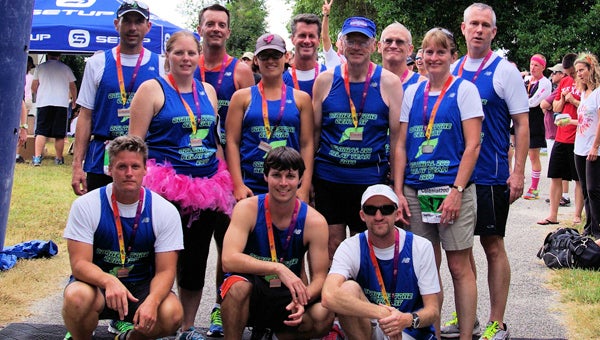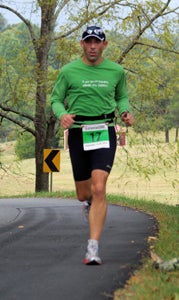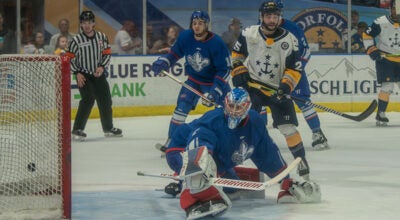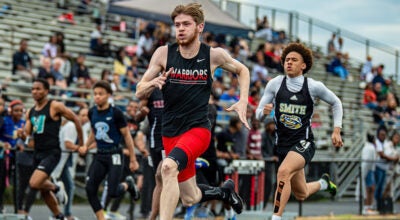In it for the long haul
Published 9:27 pm Tuesday, September 24, 2013

The Cornerstone Century team gathers at the finish line of the Colonial 200 Relay in Williamsburg on Saturday afternoon. The team of 12, which includes six Suffolk runners, ran there in a 36-leg relay from Beaver Creek Park in Albemarle County, 207.7 miles away. Front row, from left: Keith Foster, Hank Stieh and Danny West; second row, from left: Melissa Lang, Andrea McHugh, Steve Jackson and Amy Grom; back row, from left: Jeff Fitch, Mike Sessoms, Mark Hollingsworth, George Nelsen and Kevin Grierson.
Twelve runners, including six from Suffolk, banded together over the weekend, taking turns participating in a 207.7-mile relay race from the Charlottesville area to Williamsburg.
With limited sleep and food during the non-stop event, the team known as Cornerstone Century began the odyssey Friday morning and finished Saturday afternoon, coming in ninth out of 24 teams that finished.
Each runner on the team came from the local running group, the Cornerstone Striders, and it was the first time any of them had competed in the event, known as the Colonial 200 Relay.
Stephen Jackson of Suffolk led the effort to get the team organized.

Jeff Fitch of the Cornerstone Century team runs leg five of the Colonial 200 Relay race in Ruckersville. The team placed ninth out of 24 teams that finished, traversing the 207.7 miles in 29 hours and 32 minutes.
“I think it’s a great twist on running, because running, for the most part, is usually an individual sport,” he said. “This is actually a team approach.”
Jackson and three other team members had run in the Colonial 70 Relay last year with a team of six, but Jackson said, “We wanted a little bit bigger challenge.”
He predicted the team pace last weekend would be about eight minutes and 30 seconds a mile and was pleased to see it come very close. Starting at 9 a.m. on Friday, the group crossed the finish line 29 hours and 32 minutes later, with a pace of 8:31 per mile.
“I thought we did a really good job,” he said.
“We really enjoyed it, and it was a very different challenge than we’ve ever been faced with before,” Andrea McHugh of Suffolk added.
The relay is sponsored by the Palmetto Race Group, which was formed by two men from South Carolina who love both running and racing, particularly the team endurance variety. They had organized successful races in their home state and, having ties to Virginia, decided to bring the event here.
The race began at Beaver Creek Park in Albemarle County and finished in historic Jamestown. The course avoided main roads, weaving from wine and horse country to the north and east of Richmond. Then, it joined the Capital Trail to finish at Jamestown Beach Park.
There were 36 legs to the race, ranging in length from around nine miles to a little more than two. Each Cornerstone Century team member ran three non-consecutive legs, equaling 16-19 miles total.
While one member of the team was active, most of the rest were huddled in a van, leapfrogging along the course throughout the race and sometimes shadowing the active runner, offering encouragement. When they weren’t offering encouragement, the non-running team members tried to sleep or just chatted.
“We all got along well, even though a number of the people had never met each other,” Jackson said.
“We spent a lot of time laughing more than anything else, especially when we were getting really tired,” McHugh said. “After 30 hours of being in the van, we were all pretty smelly. We had all seen each other at our worst, but everybody was very lively.”
A team member’s truck followed along with extra water and supplies and provided a bit of extra space for the teammates.
Runners were part of a consistent rotation about 10 legs between each turn. The breaks allowed stiffness to set in.
“The real challenge is to remain as limber as you can,” Jackson said.
As the day wore on, another challenge became the lack of good, nutritious food. Space limitations did not allow for much aside from power bars and peanut butter and jelly sandwiches.
Sleep deprivation became a factor, too. Jackson figured he got “less than two hours sleep.”
Helping the runners push through it all, aside from long distance training, was the support from the van. It would jump ahead a couple miles and wait to cheer the runner as they passed by.
“We repeat that process through the whole race, just because it really does make a huge difference to have somebody rooting for you and encouraging you along,” Jackson said.
And the team seemed excited about a return next year.
“I’ll be there next year, absent something unexpected,” Jackson said.
“I would totally do it again,” McHugh said. “I think the rest of the team would feel the same way.”






